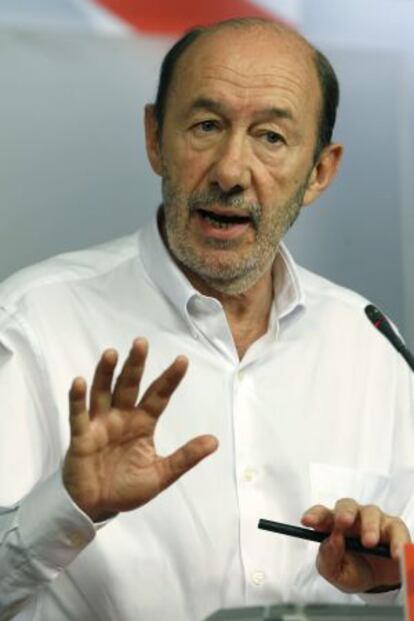Voter confidence in political leaders plummets, new poll reveals
Trust in prime minister non-existent among 84 percent of respondents

Spain's two main parties are sinking in the esteem of citizens. Although the Popular Party (PP) and the Socialist Party (PSOE) continue to control the vast majority of state, regional and local agencies, they have jointly lost more than 19 percentage points in voter intention in just one year, since general elections were held on November 20, 2011, a Metroscopia opinion poll shows.
Equally significantly, both party leaders have completely lost the confidence of the voters: 84 percent of respondents said they trust Prime Minister Mariano Rajoy, of the PP, very little or not at all. For Alfredo Pérez Rubalcaba, the Socialist leader and former government official in the Zapatero administration, distrust shoots up to 91 percent. And the worst part is that this figure is 80 percent among his own Socialist voters.
Until now, Spain's major parties had taken refuge in the fact that, when one of them lost the elections to the other, it was only a matter of time until the tables were turned. This seemingly automatic rotation is similar to the cycle that marked the 1875-1902 period in Spain, when the liberal and conservative parties took turns in power during the restoration of the Bourbon dynasty to the throne.
Now, however, it appears that Spaniards are turning their backs on this automatic two-party system, even if electoral legislation continues to favor it. While the PP governs the country with an absolute majority and controls the vast majority of regional and local governments, in this last year it has lost 13 points and current voter intention is only 31.8 percent.
It appears that Spaniards are turning their backs on this automatic two-party system
For the PSOE, things are even worse. If November 20, 2011 marked its worst electoral result ever, voter intention has dropped a further six points since then, with no signs of a slowdown. The pessimists compare the Spanish Socialists to Greece's PASOC, which went into freefall after being in power and now represent an irrelevant 10 percent of votes. Rubalcaba has been unable to rid himself of the weight of his own role during the crisis when his party was in power and he was deputy prime minister, pushing through some of the biggest social cuts in democratic history in an effort to keep away the specter of a bailout. Rumor has it that a different candidate will be selected for the next general elections.
The erosion of the two-party system is also evidenced by regional election results in Andalusia, Asturias, Galicia and the Basque Country this year, where other, smaller parties have benefited. Catalan elections are coming up, although the issue of independence will be more important there.
At the national level, the party that has performed best since last year's general elections is Unión Progreso y Democracia (UPyD), whose voter intention has doubled to 8.5 percent. UPyD and other small parties are benefiting from a groundswell of voter disenchantment with politicians who are viewed as incapable of fixing the economic crisis because of their vested interests in the current system.
Tu suscripción se está usando en otro dispositivo
¿Quieres añadir otro usuario a tu suscripción?
Si continúas leyendo en este dispositivo, no se podrá leer en el otro.
FlechaTu suscripción se está usando en otro dispositivo y solo puedes acceder a EL PAÍS desde un dispositivo a la vez.
Si quieres compartir tu cuenta, cambia tu suscripción a la modalidad Premium, así podrás añadir otro usuario. Cada uno accederá con su propia cuenta de email, lo que os permitirá personalizar vuestra experiencia en EL PAÍS.
¿Tienes una suscripción de empresa? Accede aquí para contratar más cuentas.
En el caso de no saber quién está usando tu cuenta, te recomendamos cambiar tu contraseña aquí.
Si decides continuar compartiendo tu cuenta, este mensaje se mostrará en tu dispositivo y en el de la otra persona que está usando tu cuenta de forma indefinida, afectando a tu experiencia de lectura. Puedes consultar aquí los términos y condiciones de la suscripción digital.








































